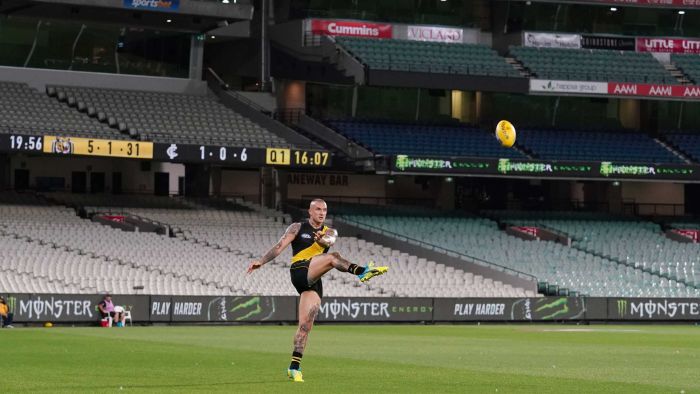Appropriately, one of the last major sports stories of 2020 was the shock revelation that the Sydney Test would be played in… Sydney.
Just nine months ago this would have been like declaring the Running of the Bulls would be held in Pamplona or Wimbledon would be played on grass.
Yet, after a period of complete deprivation and then frantic reorganisation and redistribution, it is safe to say we will not take sport for granted for some time.
For many of us, organised sport is not merely a welcome distraction from life’s often more mundane realities, it is as soothing and reliable as the changing of the seasons.
Test cricket, the Australian Open tennis, the start of the various football seasons, the brief flirtation with horse racing interspersed with the various annual international tournaments, majors, grand slams and quadrennial blockbusters have been the bookmarks of our lives.
So the absence of professional sport, and then its return in various truncated, relocated and unattended forms, was both jarring and an opportunity for reflection.
Most pertinently, we had the chance to ponder what sport really meant to us; and what it meant altogether.
The first question for those who have often threatened to tear up our club membership if our team continued to pick “THAT HACK!” or play “LIKE CRAP!”, but always relented, was would we miss it?
I imagine the consensus view would be the absence of professional sport made Joanne Public even fonder of her club and her game of choice, and that its return provided precious comfort and distraction for locked-down residents particularly.
In this context, administrators who worked long hours to solve complex cross-border logistics and relaunch leagues and competitions, and athletes confined to hubs were cast as heroes to the fans for whom they were providing an invaluable service while enduring considerable personal sacrifice.




This is true to a point, although the experience of the suddenly non-attending fan should not be taken for granted.
Personally, the year’s sports-supporting mementos are an unused Melbourne Cricket Club membership card and a football club subscription complete with pristine scarf, the remnants of the first season in 30 years that I could not attend an AFL game.
It was not so much the game itself that was missed, but the social interaction with family and friends in the grandstand or over post-match drinks at a nearby pub.
For some of us — as much as our attendance is discouraged by the thumping “crowd activation” drowning out our conversation, or schedules weighted heavily toward attracting TV audiences — sport remains both an event and a meeting place.
There is a legitimate concern for Australian sports clubs that fans won’t return after forfeiting membership money last season when games were cancelled or relocated.




But for lovers of live sport there is an equal concern the absence of spectators this season will only accelerate the rate at which changes designed to maximise TV eyeballs are initiated and spectators now deemed “fortunate” to be able to go to sport will be further marginalised.
Meanwhile, during a year when TV networks never had a better opportunity to condition spectators to view games from their sofas rather than at the stadium, it could be argued the quality of some productions had the reverse impact.
AFL commentators screaming above the play or engaging in the most banal in-house banter; Channel Nine expert Phil Gould barracking for his Panthers in the NRL grand final with the one-eyed intensity of the most crazed fan. Suddenly the long drive to the stadium or the queue to get a beer didn’t seem so bad.
Of course, inevitably it is our addiction to our sport and our club that keeps us coming back. And regardless of our detachment or the sometimes irritating commentary filter through which we are forced to observe, there was much to be admired this year from athletes and clubs performing in trying circumstances.
In that regard, the most revealing comment about any sports team came from Richmond’s mindfulness coach, Emma Murray, when asked about the Tigers’ response to several controversial incidents during the season, including players fighting on the Gold Coast strip.
Such poor behaviour seemed to fly in the face of the image of Richmond exceptionalism portrayed by various authors and spruikers who had chronicled the club’s previous seasons with a misty-eyed parochialism.
But Murray pointed out no-one at Richmond had “ever thought we were perfect”, and it was the preparedness to cope with the “inevitability of imperfection” and even failure that gave the clubs its greatest strength.
That sentiment might also help explain our abiding love for professional sport as much as its mere ability to provide a distraction in dark times or the odd uplifting moment in that rare great season.
If you’ve watched long enough you are prepared for sport’s imperfections, geared for the disappointments and — now more than ever — accustomed to the rather jarring way it is sometimes presented.
Perhaps that is the lesson from our odd, dislocated sports experience in 2020 and the secret of our loyalty to game, club and athlete — we do not merely love professional sport, we tolerate it.







